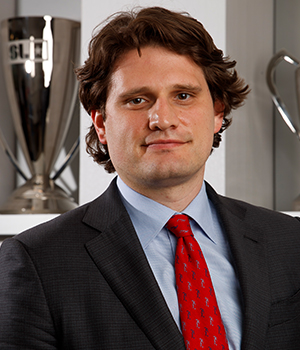
Justin Papadakis
Chief Operating Officer
Chief Real Estate Officer
United Soccer League

“Strive to put your passions into reality”
For Justin Papadakis, Chief Operating Officer and Chief Real Estate Officer of the United Soccer League, the pathway to success starts with a very personal motivation.
"As a former elite player who has gotten so much from soccer, I have an unwavering passion for growing the game in the United States," Papadakis says. “We are working to shape the future of soccer in America, because I know personally how the sport can have a positive social and economic impact on local communities.”
His love of the game has driven Papadakis and shaped his professional career and his business philosophy. He adheres to a strategic approach that allows him both to see the big picture of the USL’s growth opportunity and to map out the challenges of navigating a developing business. In his role overseeing the development of complicated stadium construction projects, he preaches patience when working with multiple stakeholders.
“To me, leadership is about bringing together people with different interests to achieve a common goal,” he says. “For a sport to reach its potential, it needs to leverage an entire ecosystem of players, coaches, referees, executives, owners, commercial and municipal partners, stadium developers, and fans. We must focus on consensus building and innovation.”
So far, Papadakis’ efforts are paying off. The USL, which engages millions of fans each week, is the largest and fastest-growing soccer league organization in the world, with a presence in more than 200 communities across the United States. It has recently embarked on an ambitious multiyear growth strategy that includes the launch of two women’s leagues (one professional, the other pre-professional), up to 50 new professional clubs, and more than 30 new stadium development projects.
he development projects, in particular, are key to the organization’s long-term strategy. They are no longer simply about building a sports venue. The USL is focused on creating “stadium-anchored entertainment districts” that can transform whole communities while also elevating the game in the U.S.
“For fans, the stadium becomes the ‘community’s living room,’ where they come together every week for matches,” Papadakis says. “But they can also be surrounded by multiple entertainment options. Simultaneously, the soccer industry grows because of a world-class facility creates a better in-stadium fan experience, attracts higher-quality players, and broadens the investor potential.”
Two projects exemplify the USL’s community building potential. In Rhode Island, more than $300 million in private investment is transforming land that was previously unutilized. Now, it is being brought to life with the construction of a world-class stadium, apartments, offices, and restaurants that will be interconnected via pedestrian bridge across the river. The ambitious project has inspired many individuals and business leaders to consider moving to the Pawtucket, RI area instead of relocating to Boston.
In Des Moines, Iowa, there was 43 acres just south of downtown has sat idle for decades. The USL and the local club ownership group is now involved in a $535 million stadium-anchored project called the Global Plaza. It includes a stadium, complementary development, and a large green space for community use.
“Our stadium-anchored entertainment districts try to engage fans – and others in the community – in deeper ways,” says Papadakis, who taps into his background in traditional shopping centers to guide him in the stadium real estate endeavors. He objects to the trend in brick-and-mortar developments that are purely transactional – shop, buy, leave – and sees a much more community-centered future for commercial areas. “The starting point that we give our architects is to design shared spaces that will bring people together so that they can create memorable experiences with their friends and family.”
Beyond real estate development, the USL has long seen itself as a unique platform for innovation. For example, in 2017, the USL Championship broke ground by being the first professional soccer league in the world to use Video Assisted Replay (VAR). Through WSC, an AI-powered cloud video tool, the USL and its clubs can deliver tailored content at a scale that inspires our fans in real-time and sees valuable efficiencies for staff.
“We want to assist aspiring entrepreneurs and develop talent,” Papadakis says. “This includes such activations as collaborations with local designers on limited-run merchandise, spotlighting young chefs by having food trucks to matches, and a programme to develop on-air talent through the thousands of live matches we broadcast on the ESPN platforms.”
Likewise, the USL is giving more and more professional opportunities to players. In the 2022 season, there are 1,000 professional player jobs in the USL ecosystem. The organization aims to have 2,000 jobs by 2026.
A key area for this growth is in the women's game. In 2023, the USL Super League, a new fully professional women’s soccer league, will launch, immediately doubling the number of professional women’s players in the United States. The Super League’s growth projections will see that number double again by 2026.
True to its spirit of innovation, the USL will break the mold for women’s soccer in the U.S. when the Super League launches. In coordination with the USL Championship, the USL’s top professional men’s league, the Super League will be the first soccer competition to have an equal pay structure for men and women players in the U.S.
“We always look to do the right thing, and providing an equal playing field for men and women in soccer aligns perfectly with that approach,” Papadakis says. “It makes sense from a business perspective. It expands our ability to provide professional opportunities for players. It gives us more programming for our stadiums. It broadens our pool of sponsors. And it engages more fans. In short, it grows the game.” IE

Company
Management
Justin Papadakis
Chief Operating Officer
Chief Real Estate Officer
United Soccer League
Description
The United Soccer League (USL) is the largest and fastest-growing professional soccer organization in North America, possessing more than a decade of experience in bringing the world’s game to communities across the United States and Canada. Overseeing the USL Championship (USSF Division II), USL League One (USSF Division III), and USL League Two (Pre-Professional), the organization is built on a proven and recognized model in international football and counts more than 125 clubs in its membership.

